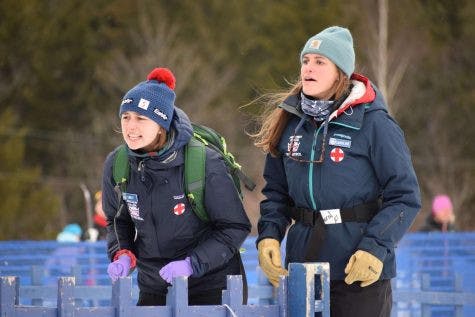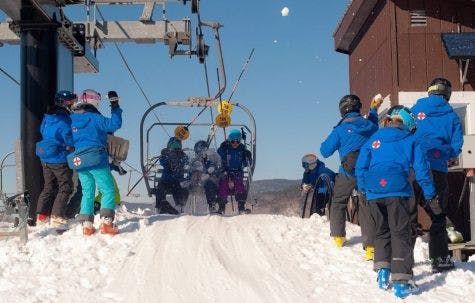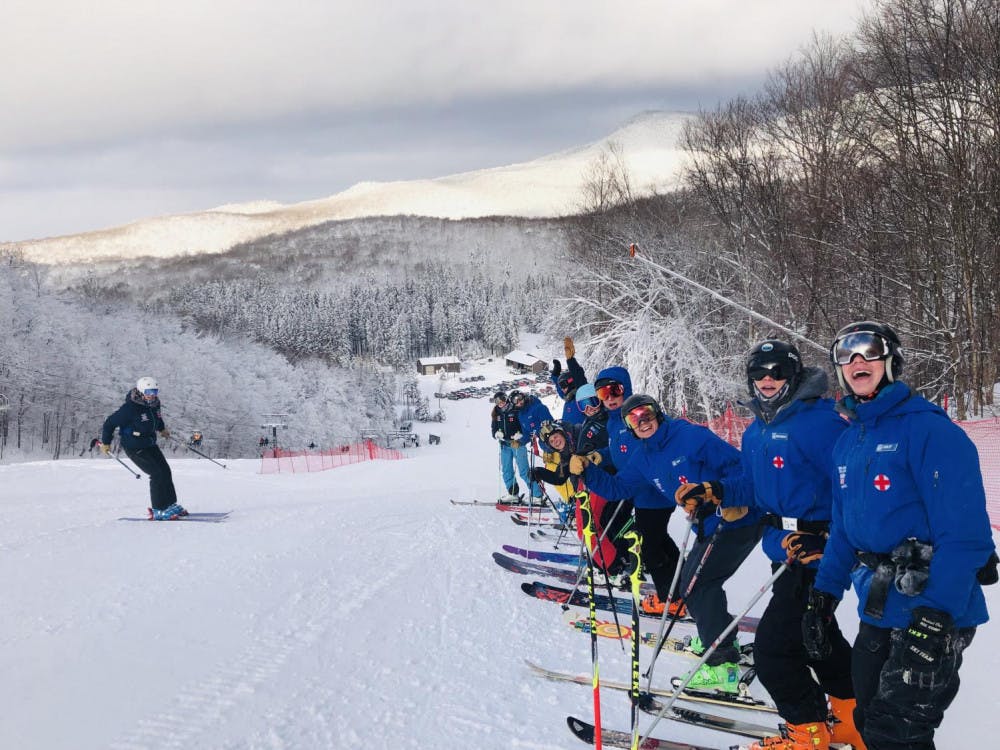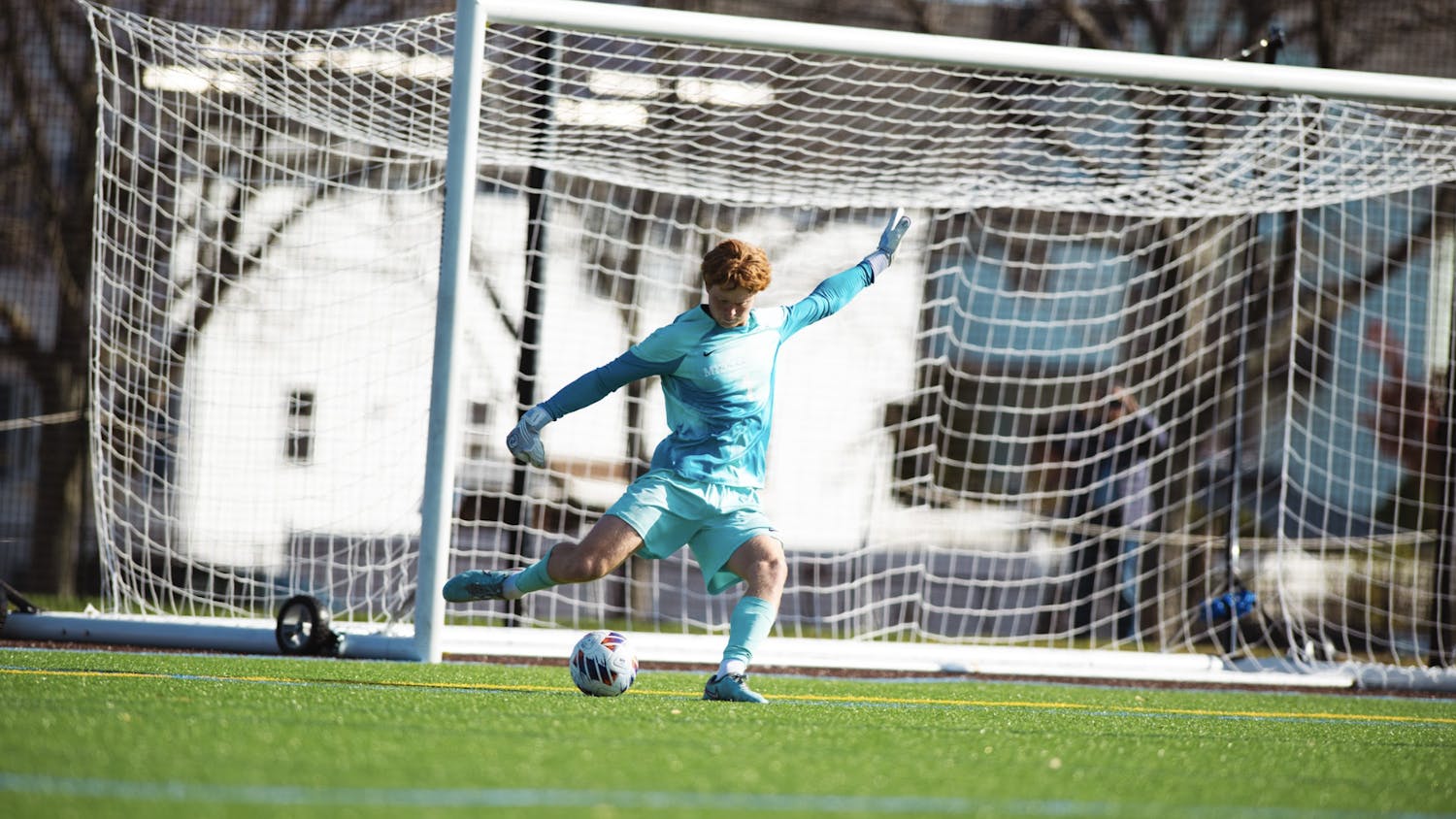Picture this: It’s Sunday morning. You snooze your alarm three times at 11:00 before you get the courage to brave the -2-degree winds and make the journey through the snow to find the nearest open dining hall. You take your time, kicking your legs up and preparing for some “Sunday Scaries.” This may be the life of an average Middkid. But for a volunteer ski patroller? Quite the opposite.
Ski patrol: the heroes that we didn’t know we needed until we had them. They are not only students, but also masters of the mountain. Not simply athletes, but qualified medics. Not just “sendy” (as senior President Kaitlyn Francis coins them), but professional.
The day on the job for a patroller starts with a harsh 7 a.m. breakfast. In the spirit of camaraderie, the goal is to get there as timely as possible in order to make sure that no last-minute stragglers slept through their alarms. The squad then makes their way to the Middlebury Snow Bowl with a prompt 8 a.m. arrival. After slapping on some boots and other gear to protect them from the freezing temperatures, they find out their two to three responsibilities for the next eight hours in the office. Some of these include the coveted top hut duty (sitting pretty at the top of the mountain waiting to jump on any type of accident) and Sheehan duty (skiing to the left side of the mountain by Sheehan lift). Emily Kohutnicki ’20 claims that her duty of choice is the “top hut duty” (hot tub top hut). She loves this role because it’s where she can “really spend some time with fellow patrollers and get to know both new and old friends.”

Emily Kohtunicki ’20 (left) and Caroline Daley ’20 (right) cheer on fellow Panthers during Winter Carnival.
The process of joining the squad is no easy task; it requires strong mental and physical capabilities. A prospective patroller has to be both a skilled and experienced skier, as well as pass written and oral exams that earn you a role just below that of an EMT, a certification known as Outdoor Emergency Care (OEC). Current members of patrol teach the class every Sunday for three hours during the fall semester, so if you’re not 100% committed, your spot on the Bowl looks pretty bleak. It is as if you are taking a fifth class, which is a huge sacrifice for a goal that is by no means promised, even if you pass the challenging standardized tests. The course even entails a midterm involving practicals, which are scenarios of injuries that are set up by the patrollers which students then must respond to flawlessly. If you thought a midterm was a lot for an extracurricular, then you will be shocked to hear that they even have a final exam given by the National Ski Patrol (NSP), where they must earn at least an 80%.
The journey does not stop here. Next, your ski abilities are put to the test, and the Vermont conditions are anything but a walk in the park. Only students with the highest scores are admitted to the mountain, and from here on physical aptitude is carefully examined — may the best skier win. With the patrollers only having a few slots open, there is no margin for error and your skills must be executed without any blemishes.
So, after reading about the arduous process, why join patrol? Veteran skier Kohutnicki commented that she joined because of the social aspect and the people she found. “Being an intimidated freshman living in Coffrin with only a handful of others, I wanted to find a way to meet new people and find friends with a common interest – skiing, duh,” said Kohutnicki. “Some people are pre-med students who ski [who] wanted to combine academics with pleasure, but I just thought the idea of responding to injured skiers on the mountain could be fun and fulfilling.”
Although this process seems as if it would produce a cutthroat and hypercompetitive atmosphere, most who experienced this overwhelming process emerged with a different perspective. Kohutnicki commented that she did not find the environment to be too competitive. Even though they were competing against each other for six or seven spots, students would study with one another and veteran patrollers jumped at the chance to help with lingering questions. One would think that the ski test would be even more intimidating, being a more athletic contest, but it was more of the same positive and encouraging energy.
Old-timer Francis said that her favorite aspects of ski patrol are the people and the culture. “We all love spending time together on and off the hill, and there is a strong culture of “sendiness” and a “love of skiing,” Francis said. “Ski patrollers have become some of my best friends at Middlebury which makes volunteering as a ski patroller not feel like a job but rather just a blocked-out time chunk to spend with people I love being around.”

The ski patrol greets skiers unloading at the top of the Snow Bowl.
But it is definitely not all fun and games and the squad knows how to balance fun and professionalism. Francis commented on one of the more dangerous aspects of the job where quick action is key. “It’s definitely intense when we get a call about anything head or C-spin related where we would need to backboard, since these types of injuries can be really serious and especially with spinal injuries there isn’t room for error on our end,” Francis said. “But we do so much training throughout the fall when we teach or take the OEC class and on-hill in the winter that responding becomes almost automated. Having drilled in practice, responding to accidents doesn’t feel scary since I definitely have always felt super prepared by all the training we do.”
One of the most exciting days for patrollers is their claim to fame on Winter Carnival, when Middlebury hosts multiple schools to race down the Bowl. For some, this is a weekend in which many students use to enjoy the finer things at Midd, but this is the day in which patrollers must be most active. With rowdy students crawling their way to the top of the Bowl in Converse, the patrollers are only drunk with excitement. Despite being on duty, Francis claims that Winter Carnival is one of her favorite days of the year. “It is so much fun to be on skis and feel part of the skier hype as well as the energy that the silly people bring up from campus,” she said. “I really love getting to see everyone who comes up to the Bowl and being able to get right into the roost mosh pit, but then ski down and watch my friends racing from the bottom. It’s actually a pretty great day to be in the office, bopping around on skis.”
Graduating this spring, Francis has been able to develop her leadership and organization skills while in charge of the ski patrol squad, since all of the group’s educational, fundraising, scheduling and social operations are run by the students. “I really appreciated the opportunity to take charge of these different elements and am so grateful to the group for being so willing to volunteer for various jobs,” she said. “We were a small group this year which means that the class and fundraising efforts needed all hands on deck, which was stressful at times but in the end I think improved all of our leadership and communication skills.”
Community building has been at the heart of Francis’ time on ski patrol and one of the highlights of her Middlebury career. “It is pretty rare to be able to post in a GroupMe about a sunrise skin and have more than a dozen people immediately be up for the challenge and early morning,” she said.
We saw winter come and go. New waves of fresh-faced patrollers entered the scene as “washed up” seniors take their last runs down the mountain, dressed to the nines in their unmistakable bright blue jackets with their radios weighing them down. These are truly the unsung heroes of the Bowl, protecting the community one run at a time. Now, all we can do is wait for another Vermont winter of “sendiness.”
Ski Patrol: The Unsung Heroes of the Snow Bowl

COURTESY PHOTO
The ski patrol has helped keep skiers at the Snow Bowl safe since the group was founded in 1946.
The ski patrol has helped keep skiers at the Snow Bowl safe since the group was founded in 1946.
BENJY RENTON
COURTESY PHOTO
Comments



